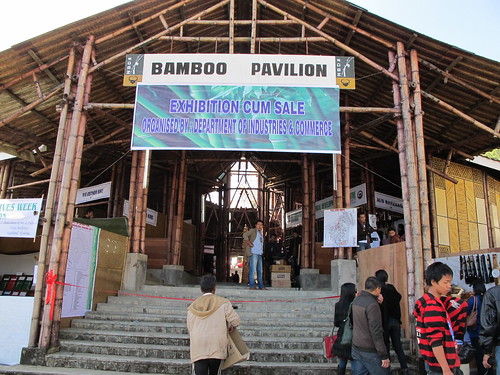I was telling the story that I blogged about in my previous post to someone in Guwahati. When I got to the part where I was saying 'I don't understand Hindi', I told her I'd said:
मुझ को हिन्दि नहिँ आती है।
mujh ko hindi nahiin aatii hai.
(lit. 'To me Hindi does not come').
She burst into laughter and exclaimed, "But you're not a woman!"
This raised a rather interesting linguistic question for me. The issue here was that I had used the feminine participle of the verb 'to come': आती aatii where she had expected the masculine singular form आता aataa.
Now, what I'd learnt in my few weeks of Hindi lessons from a tutor from Lucknow was that in Hindi, all nouns have grammatical gender (like other Indo-European languages such as French and Russian) and that verbs agree with their subject in gender and number. In French, for instance, some verbs agree with their subject for number and gender in the passé composé 'compound past tense', e.g. Le jour de gloire est arrivé. 'The day of glory has come', but Les pluies sont arrivées. 'The rains have come' because jour 'day' is masculine and singular while pluies 'rains' is feminine and plural. (Note that the difference is only visible in the written language.)
In a clause like mujh ko hindi nahiin aatii hai, the grammatical subject is actually hindi, which I am told is a feminine noun. The form of the 1st person singular mujh ko has an oblique case, which translates to something like 'to me'. Therefore, what I was doing was making the verb agree in gender with the noun in subject position. However, I've been told that outside the main Hindi speaking regions of Uttar Pradesh (including Lucknow where my tutor was from), and outside what is prescribed as 'grammatically correct' Hindi, subject-verb agreement is not as strict as how I'd applied it.
It's also obvious from my friend's reaction that the verb needed to agree with the 1st person singular mujh ko (who is male), even though morphologically it was marked for the oblique case.
This is not to say that what I had said was wrong, or that my friend was wrong, it's just that there are various varieties (and registers) of Hindi that are spoken across India. In some varieties, agreement of the kind I used is expected, but in others, it sounds either pretentious or just plain silly!
मुझ को हिन्दि नहिँ आती है।
mujh ko hindi nahiin aatii hai.
(lit. 'To me Hindi does not come').
She burst into laughter and exclaimed, "But you're not a woman!"
This raised a rather interesting linguistic question for me. The issue here was that I had used the feminine participle of the verb 'to come': आती aatii where she had expected the masculine singular form आता aataa.
Now, what I'd learnt in my few weeks of Hindi lessons from a tutor from Lucknow was that in Hindi, all nouns have grammatical gender (like other Indo-European languages such as French and Russian) and that verbs agree with their subject in gender and number. In French, for instance, some verbs agree with their subject for number and gender in the passé composé 'compound past tense', e.g. Le jour de gloire est arrivé. 'The day of glory has come', but Les pluies sont arrivées. 'The rains have come' because jour 'day' is masculine and singular while pluies 'rains' is feminine and plural. (Note that the difference is only visible in the written language.)
In a clause like mujh ko hindi nahiin aatii hai, the grammatical subject is actually hindi, which I am told is a feminine noun. The form of the 1st person singular mujh ko has an oblique case, which translates to something like 'to me'. Therefore, what I was doing was making the verb agree in gender with the noun in subject position. However, I've been told that outside the main Hindi speaking regions of Uttar Pradesh (including Lucknow where my tutor was from), and outside what is prescribed as 'grammatically correct' Hindi, subject-verb agreement is not as strict as how I'd applied it.
It's also obvious from my friend's reaction that the verb needed to agree with the 1st person singular mujh ko (who is male), even though morphologically it was marked for the oblique case.
This is not to say that what I had said was wrong, or that my friend was wrong, it's just that there are various varieties (and registers) of Hindi that are spoken across India. In some varieties, agreement of the kind I used is expected, but in others, it sounds either pretentious or just plain silly!


















